General
Mak Council Launches Grants Management System, Underscores Support Role
Published
2 years agoon
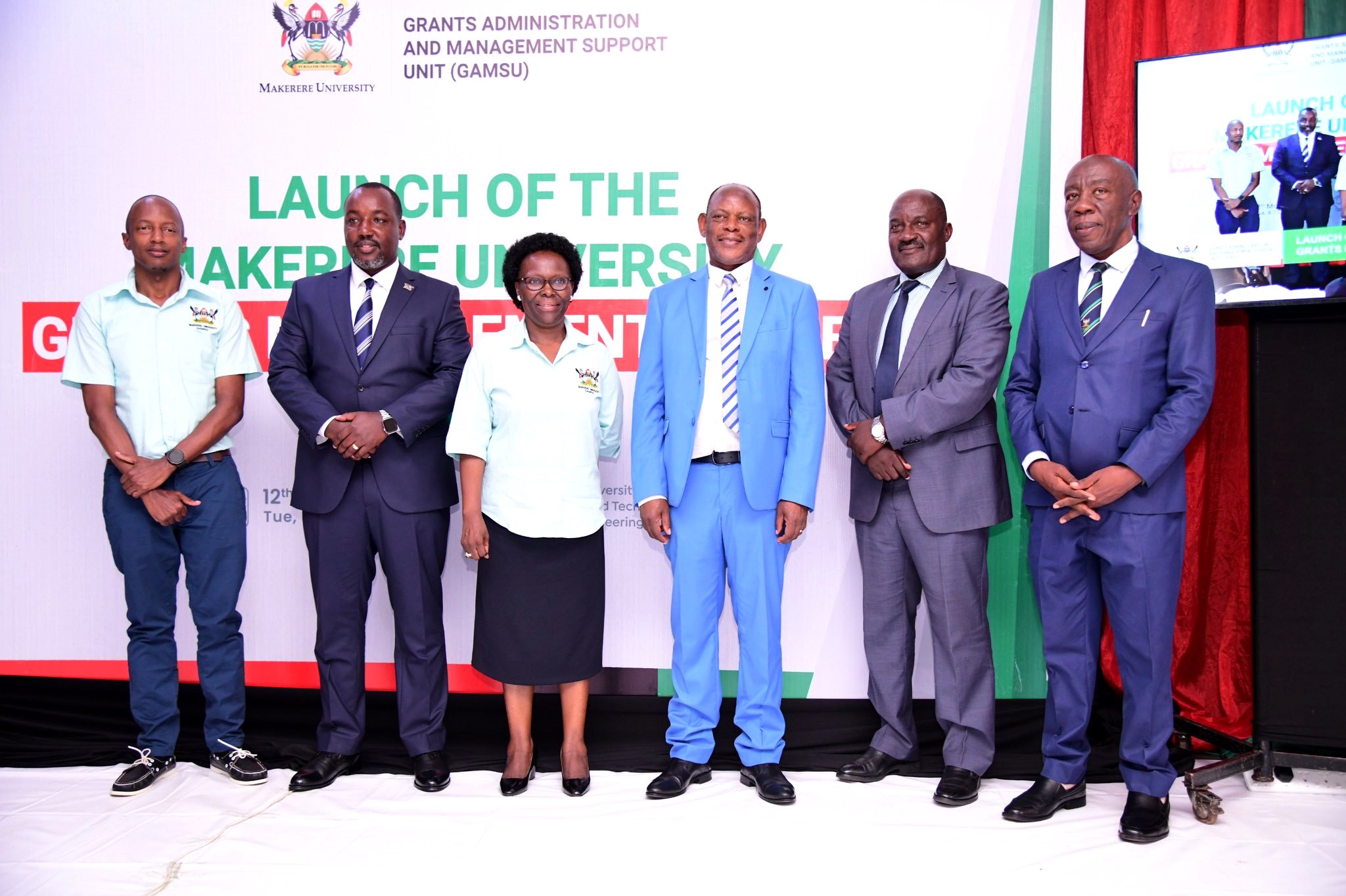
The Makerere University Grants Management System (MakGMS) was on Tuesday 12th March 2024 officially launched by the University Council at a ceremony presided over by the Chairperson, Finance, Planning, Administration and Investment Committee (FPAIC), Mr. Bruce Kabaasa. The hybrid ceremony held in the School of Food Technology, Nutrition and Bioengineering Conference Hall was graced by Members of Management led by the Vice Chancellor Prof. Barnabas Nawangwe, the Leadership and Staff of the Grants Administration and Management Support Unit (GAMSU) as well as Makerere University Research and Innovations Fund (Mak-RIF) and project Principal Investigators.
In his remarks, the Vice Chancellor who credited Chairperson FPAIC with not only conceiving the idea but also following up on the development of MakGMS concluded that there was no one better placed to launch the same. Mr. Kabaasa in turn thanked former members of FPAIC such as Prof. Winston Tumps Ireeta for going the extra mile in contributing to the formulation of the supporting regulation, the Makerere University Grants and Administration Management Policy. In the same breath, he thanked the Head GAMSU, Prof. Sylvia Antonia Nakimera Nannyonga-Tamusuza for working hard and swiftly to ensure that the MakGMS is developed and launched.
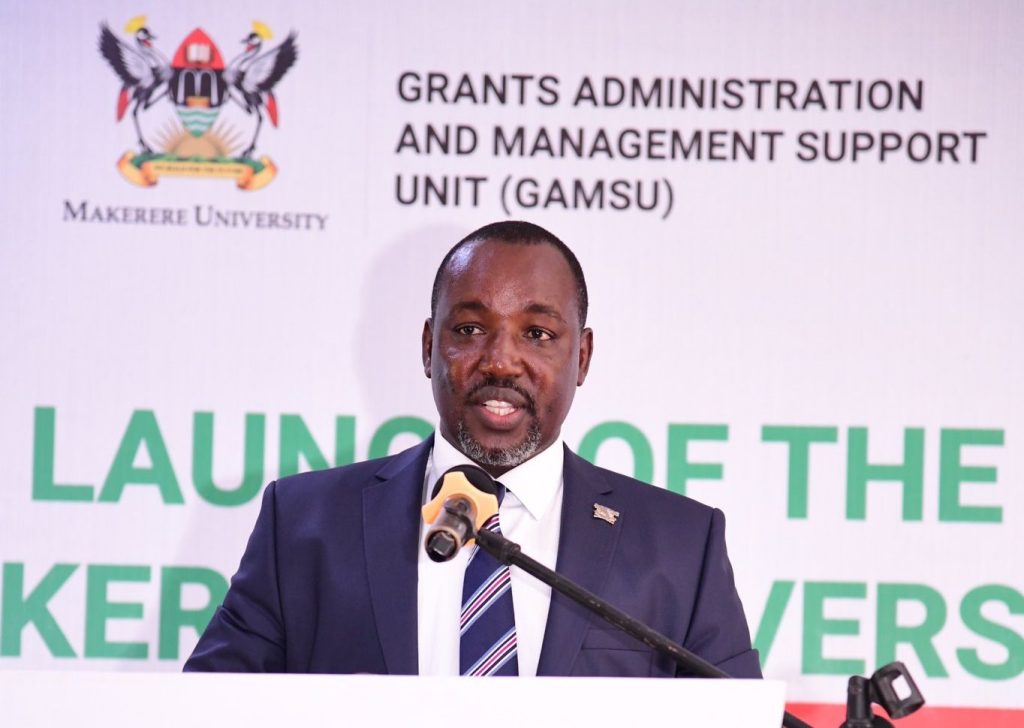
Mr. Kabaasa reassured his audience that the essence of the policy and system is not to control, but rather provide an institutionalised support mechanism for those winning grants to execute them efficiently. Additionally, he said MakGMS is meant to “support those who don’t have the grants to understand where the grants are, and to perform mentoring that those of you who are successful are meant to perform with those who are emerging because academia is a mentoring field.”
Still on academia, the Chairperson FPAIC noted that “we live in a University where statements like inter, intra and multidisciplinary are the mantras of academic discourse.” He added that these mantras are not possible if people are not relating, hence underscoring another function of the MakGMS – to provide a dashboard where at a glance, it will be easy and possible to see the research being undertaken at institutional level and how researchers can augment each other’s work.
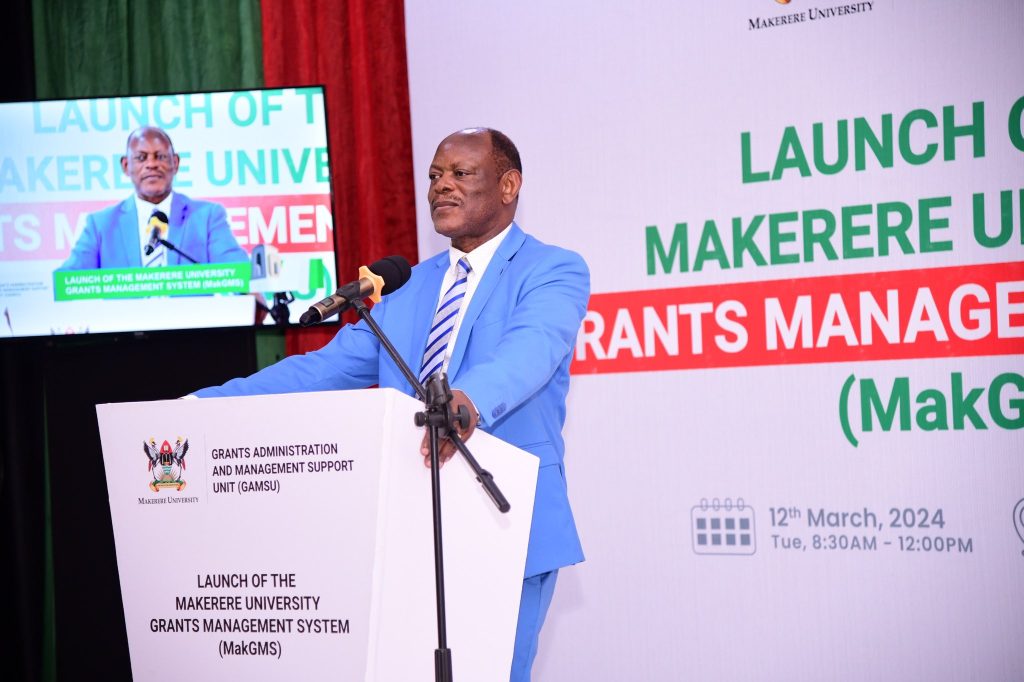
Earlier, Prof. Nawangwe in his remarks had noted that as Makerere University aims to shift from a research-intensive to a research-led paradigm, it was important to organize and automate the various systems so as to ensure that all staff and students contribute to the university’s strategic direction. Citing China’s continued rise in global influence as a result of a robust research and innovations output, the Vice Chancellor reiterated that unless systems such as MakGMS were put in place, it was going to be hard to monitor and evaluate how Makerere’s research contributes to national and continental growth aspirations.
“MakGMS is one way to streamline what we are doing so that we can do more research, attract more grants, get more people involved and know who is doing what and how it is useful for our country and continent” he stated.
Prof. Nawangwe therefore congratulated the Head GAMSU and her team for bringing the much-needed energy that has propelled the MakGMS to launch stage. He lauded the GAMSU Steering Committee headed by the Acting Deputy Vice Chancellor (Finance and Administration), Prof. Henry Alinaitwe, acknowledging that with their combined strength, the system could not fail. In the same breath, he commended the Directorate for ICT Support (DICTS) headed by Mr. Samuel Mugabi for doing an excellent job in as far as the in-house development of systems is concerned.
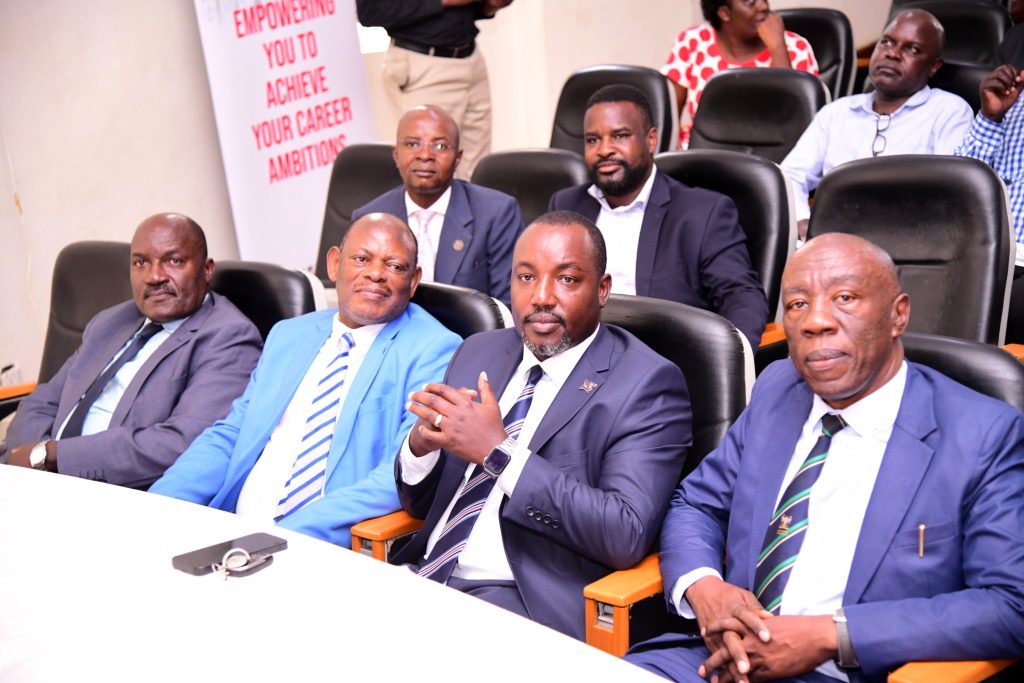
Acknowledging that GAMSU is a key unit of the university that cannot be taken for granted in terms of generating data for off-budget reporting, Prof. Henry Alinaitwe introduced members of the Steering Committee namely; the University Secretary-Mr. Yusuf Kiranda, Dr. Sabrina Kitaka, Dr. Charles Masembe, Dr. Agnes Rwashana Semwanga, Dr. Helen Nambalirwa Nkabala, Dr. Godfrey Akileng, Dr. Robert Wamala, Mr. Gyaviira Lubowa and current Head GAMSU-Prof. Sylvia Antonia Nakimera Nannyonga-Tamusuza. He equally acknowledged the contribution of former Heads of GAMSU, Prof. Grace Bantebya and Prof. William Bazeyo, whose efforts, he said, laid the foundation for developments such as MakGMS.
“Makerere is aspiring to be a research-led University and GAMSU is at the centre of that aspiration. This is where we consolidate all the data regarding grants, support research or grant writing, and report about grants in terms of topics, amounts of money received and their distributions per quarter or annum” Prof. Alinaitwe explained.
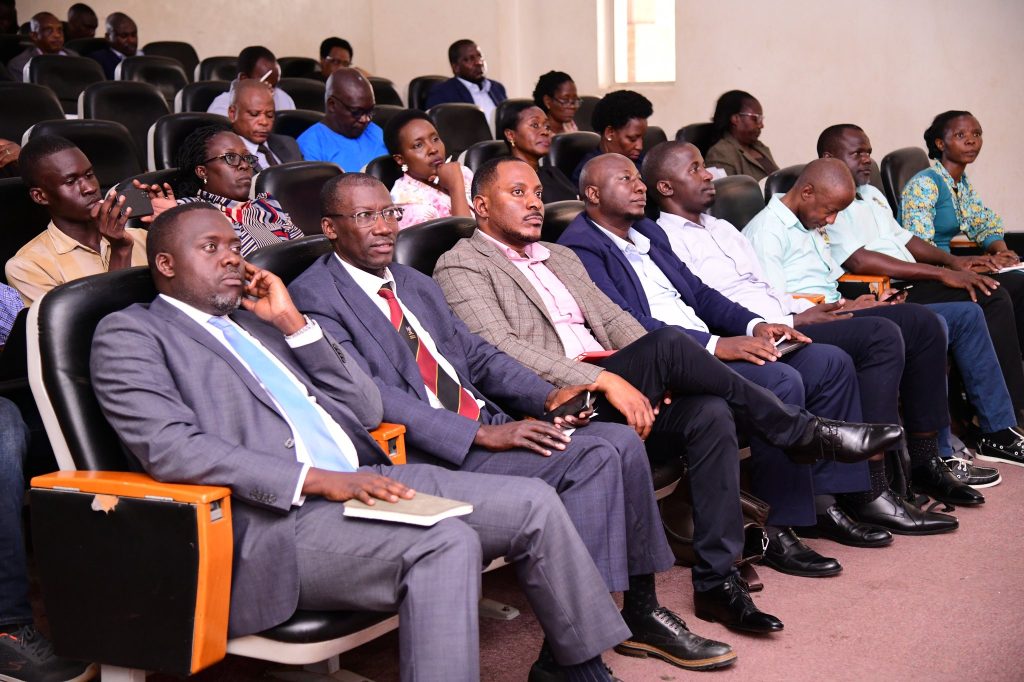
In his capacity as the University Accounting Officer, Mr. Yusuf Kiranda used the launch as an opportunity to remind the audience that all grants received by the University are subject to the supreme law in the administration of public funds i.e. the Public Finance Management Act, as well as guidelines of the Treasury Instructions 2017. Nevertheless, he noted that Section 44 of the Act provides a waiver for public entities such as Makerere to maintain the funds in-house upon obtaining exemption from the Minister responsible for Finance. He concluded by observing that whereas it had hitherto been nearly impossible to obtain the aforementioned waiver, “with the launch of this system (MakGMS), I believe that problem is resolved.”
The woman of the moment Prof. Nannyonga-Tamusuza couldn’t help but thank the Vice Chancellor for entrusting her with the huge responsibility of heading GAMSU, noting that there was no better way to commemorate her first year in office than the launch of MakGMS. She equally acknowledged the support rendered by the University Secretary and the entire Management to GAMSU during the development of the system. MakGMS was developed in-house by DICTS, with Mr. Denis Wamala as lead developer seconded by the Director Mr. Samuel Mugabi.
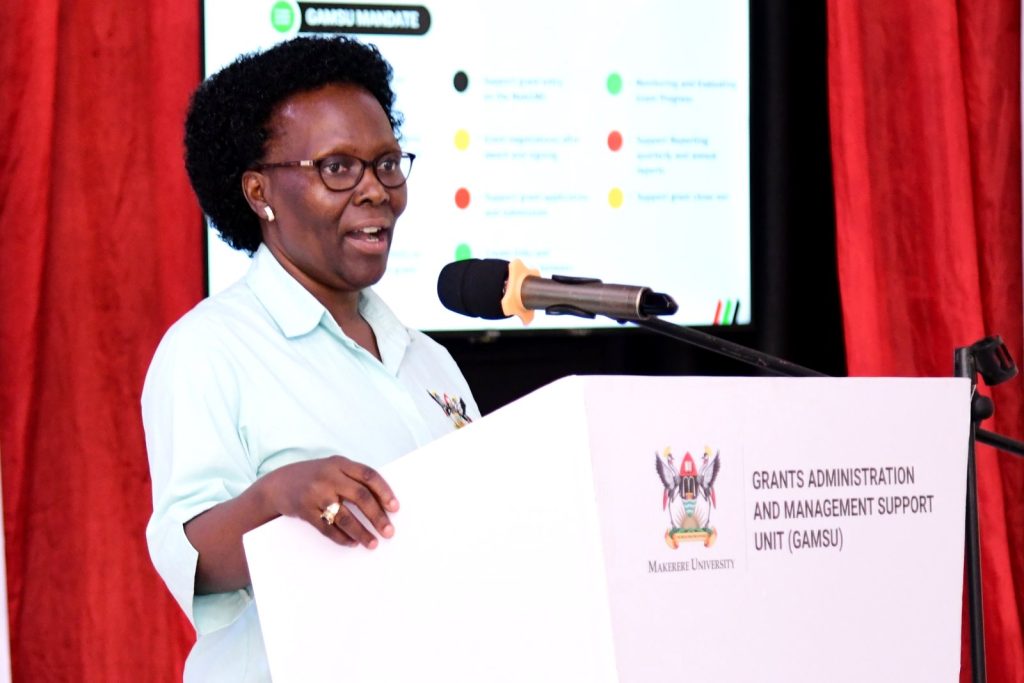
Speaking broadly about the research infrastructure at Makerere, Mr. Mugabi described ICT as “a critical enabler of the research ecosystem”, and that it is important that the University establishes state-of-the-art digital research infrastructure. He added that the approach taken by Makerere in this regard is to gradually shift from procuring expensive proprietary systems to building in-house capacity to develop systems that can solve institutional and national problems.
“We are now an integrated process-driven University but we need to become a data-driven institution and that is where the big data analytics comes in. And we need to adopt emerging technologies, which we are starting to do” Mr. Mugabi shared.
Speaking more about the system, Prof. Nannyonga-Tamusuza noted that MakGMS will require authentication using the Makerere University email credentials and all who are going to access the system will be required to sign oaths of confidentiality so as to build trust among system users. MakGMS will also support archiving of supporting documents and research data, and will be able to automatically issue certificates to users for grants received. The system will also integrate automatic communication between GAMSU and Principal Investigators so as to notify researchers on the progress of grant applications. SMS notifications to users will be incorporated in the future.
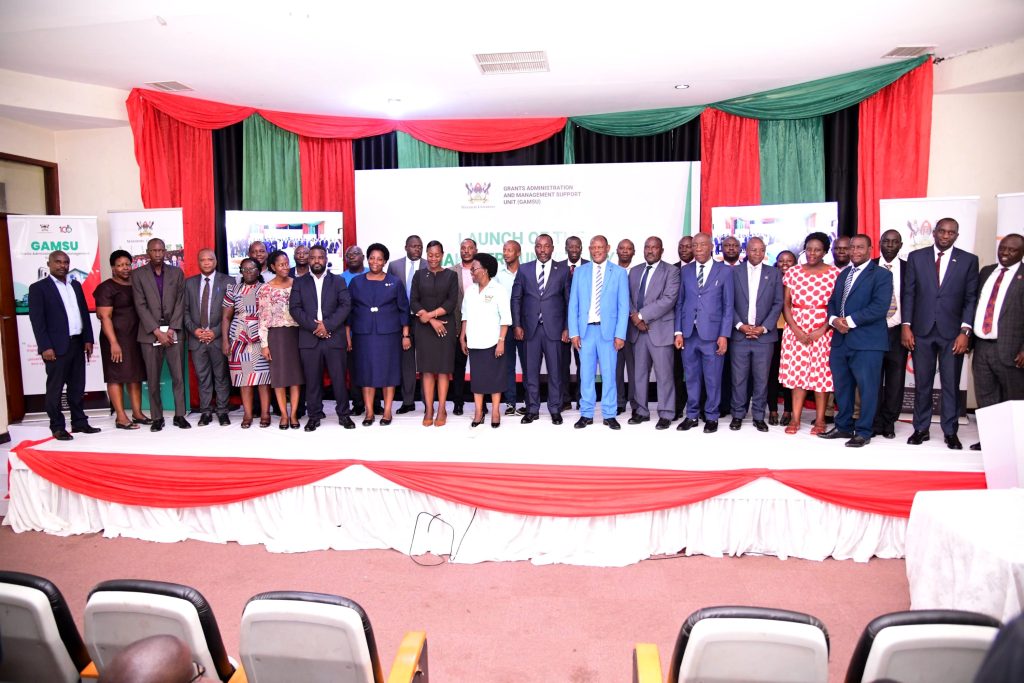
Supplementing Prof. Nannyonga-Tamusuza’s submission, the Lead Developer, Mr. Denis Wamala shared that MakGMS has been built on robust, scalable infrastructure that is primarily open source. The merits of this is that the system will be easy to integrate with other existing Information Systems, which will greatly enhance data sharing.
Prof. Nannyonga-Tamusuza concluded by reassuring all Principal Investigators that the MakGMS is here to support their work, and that GAMSU remains committed to providing training on grant writing in partnership with the Directorate of Research and Graduate Training (DRGT) as well as providing all supporting documents required during application processes. She added that MakGMS will greatly enhance monitoring and evaluation of grants performance so as to offer insights on how to improve or mitigate any risks that could arise.
Proceedings of the launch were moderated by the Principal Public Relations Officer, Ms. Ritah Namisango and committed to God Almighty through a prayer led by the GAMSU Accountant, Ms. Christine Ninsiima.
You may like
-


Mak hosts First African Symposium on Natural Capital Accounting and Climate-Sensitive Macroeconomic Modelling
-
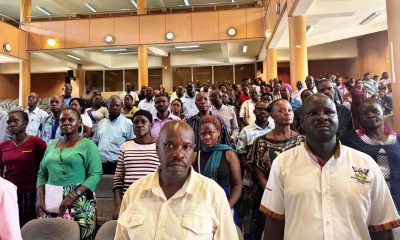

Support Staff Trained to Promote Safety of Students and Stakeholders
-
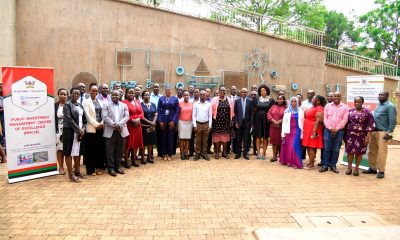

Makerere Hosts Second Cohort of MoKCC&MA Procurement Officers for E&S Safeguards Training
-
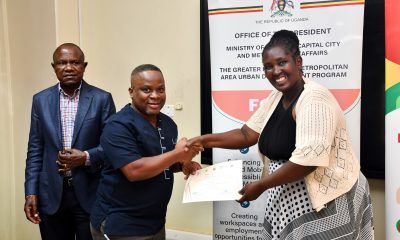

PIM Centre Awards Certificates to MoKCC&MA Officers after Safeguards Training
-


Makerere Launches Scholarly Guide, Calls for Increased Research, Publication and Innovation in Africa
-


When Birth Becomes the Most Dangerous Moment, Wanduru & the Work of Making Labour Safer
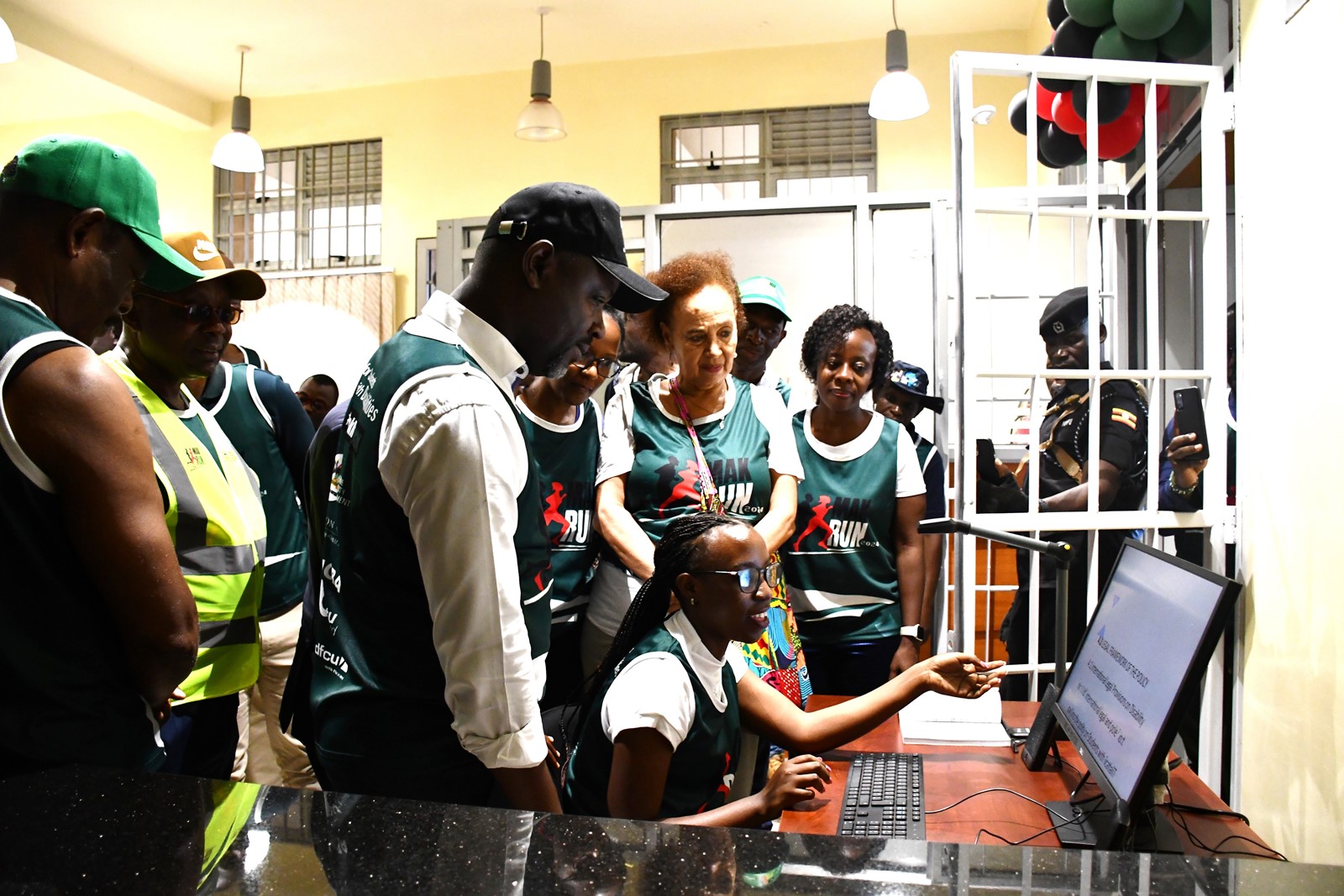
Students with disabilities at Makerere University have been requested to stop seeking for special attention and instead look for solutions and opportunities for personal growth.
This was during a mental wellness, inclusion and safeguarding session organized by the Dean of Students office and the Mastercard Foundation Scholars Program at Makerere University.
Addressing students on mental health and disability inclusion, Mr. Marvin Ggaliwango, a lecturer at the College of Computing and Information Sciences (CoCIS), noted that if the students stop complaining, they will become empowered to take charge of their own development, build resilience and engage confidently in both academic and social environments.
“Turn your lived experiences into tools for innovation. Stop complaining and start creating solutions for yourselves. You are the one living this life, and that gives you the authority to be an expert. When you develop a solution, it doesn’t just benefit you, it helps others too, by removing barriers,” Mr. Marvin Ggaliwango, said.
He encouraged students to see themselves not as victims of circumstance, but as active participants and co-creators of the inclusive environment they wish to experience.
“Learn how to communicate effectively and humbly. If you have a problem, express yourself clearly. Do not isolate yourself or feel resentful. You are not defined by disability, you may face disadvantages, but you still have ability,” he encouraged.
Throughout the session, students listened attentively as he emphasized the importance of self-awareness and personal responsibility, urging them to understand their strengths, acknowledge their limitations and take deliberate steps toward personal growth while contributing positively to the University community.
“We must enhance and ensure that our mental health is number one. Always choose yourself first. Choose what makes you happy and protect your peace. If you are at peace with yourself, your academics will improve. There is a strong link between mental wellness and academic success,” Mr. Ggaliwango, noted.
In his speech, Mr. Musa Mwambu, the Disability Inclusion Advisor at Light for the World Uganda, called upon the students with disabilities to enhance and ensure that their mental health is prioritized.
“As students living with disabilities, sometimes you over expect, because you have a disability you should be given, listened to and when people do not listen to you, you attribute it to your disability, get it from me, even those without disabilities are not listened too. Things are not happening to you because of your disability it is because of the world we live in. Everything that happens to you can happen to others,” Mr Mwambu, noted.
“Have fun with your life. Make yourself happy and be smart. Present yourself in public confidently wherever you go. The way you carry yourself can improve your mental health and how others perceive you,” Mr. Mwambu said.
He reminded the students that gaining admission to Makerere is itself a milestone.
“There are many people without disabilities who have never stepped at Makerere University. Find something that empowers you and hold on to it. You may have a physical impairment, but if you are brilliant in class, you can lead discussions and inspire others,” he added.

During the session, Dr. Rodney Rugyema, the Acting Principal Warden, welcomed the students back from the long holiday. He assured them that the University is committed to their safety and well-being while on campus.
Dr. Rugyema emphasized that the University has systems in place to protect students, both physically and psychologically and encouraged them to report any concerns promptly.
“When you are at the University, you are not on your own, we are always here for you. For us to engage you on mental wellness and inclusion, we want you to be in the right state of mind, whole and complete,” Dr Rugyema, said.
He added: “We are here to empower you and we are calling upon you not be a risk for yourself and always be able to detect risks that are likely to affect your mental health and works towards avoiding them and reporting them to ensure that the University manages them before they escalate into real harm whose impact is more serious than you can think,”
During the session, Ms. Diane Nabikolo Osiru highlighted the University’s broader commitment to safeguarding.
Safeguarding at Makerere University refers to measures put in place to promote safety and wellness of all students, staffs and other stakeholders.
“At Makerere University, safety is not a luxury for few. but it is a right for every student. As the semesters begins, we are urging you to learn how to identify signs of harm or abuses and report them to the appropriate safeguarding contact points,” Ms Nabikolo, said.
For support in case of any harm or abuse, International and Refugee Students, can access support through the Advancement and International Office, while Students with Disabilities, can utilize the Disability Support Center. Those with personal and emotional challenges, can visit the Counselling and Guidance Centre.
In his speech, Dr Joab Agaba, a Lecturer in the College of Computing and Information Sciences, guided students how to report risks and incidences to the MakSafeSpace, the e-reporting platform complimenting the other University traditional reporting channels.
Mr. Henry Nsubuga, the Manager of the Counselling and Guidance Center, shared practical strategies for coping with stress effectively including time management, setting realistic goals, seeking support from peers or counsellors.
Students speak out
Shanitah Nahamya, 2nd year student of the Bachelor of Adult and Community Education
“I have learned how to respectfully and appropriately engage with students with disabilities. In the past, I often felt pity when I encountered them, but now I understand that what they need is not pity, it is respect, support, and equal opportunity.”
Guo Dorothy Geri, 1st year student of the Bachelor of Commerce
“I have learnt how to use inclusive language. Before offering help to a student with a disability, I will first ask them, because not all the time do they need our help. You might think someone wants to be helped to cross the road, yet they are waiting for someone.”
Valentines Doris Aduka, 1st Year student of the Bachelor of Biomedical Science
“I have been calling students with disabilities special names, thinking it was kind. But I have learned that they do not want to be treated differently or labeled in a special way. What they value most is being treated like everyone else, with respect, dignity, and fairness.”
General
Strengthening Global Partnerships to Advance Research, Innovation, and Graduate Training: Makerere University Hosts Delegation from the University of Warwick
Published
4 days agoon
February 19, 2026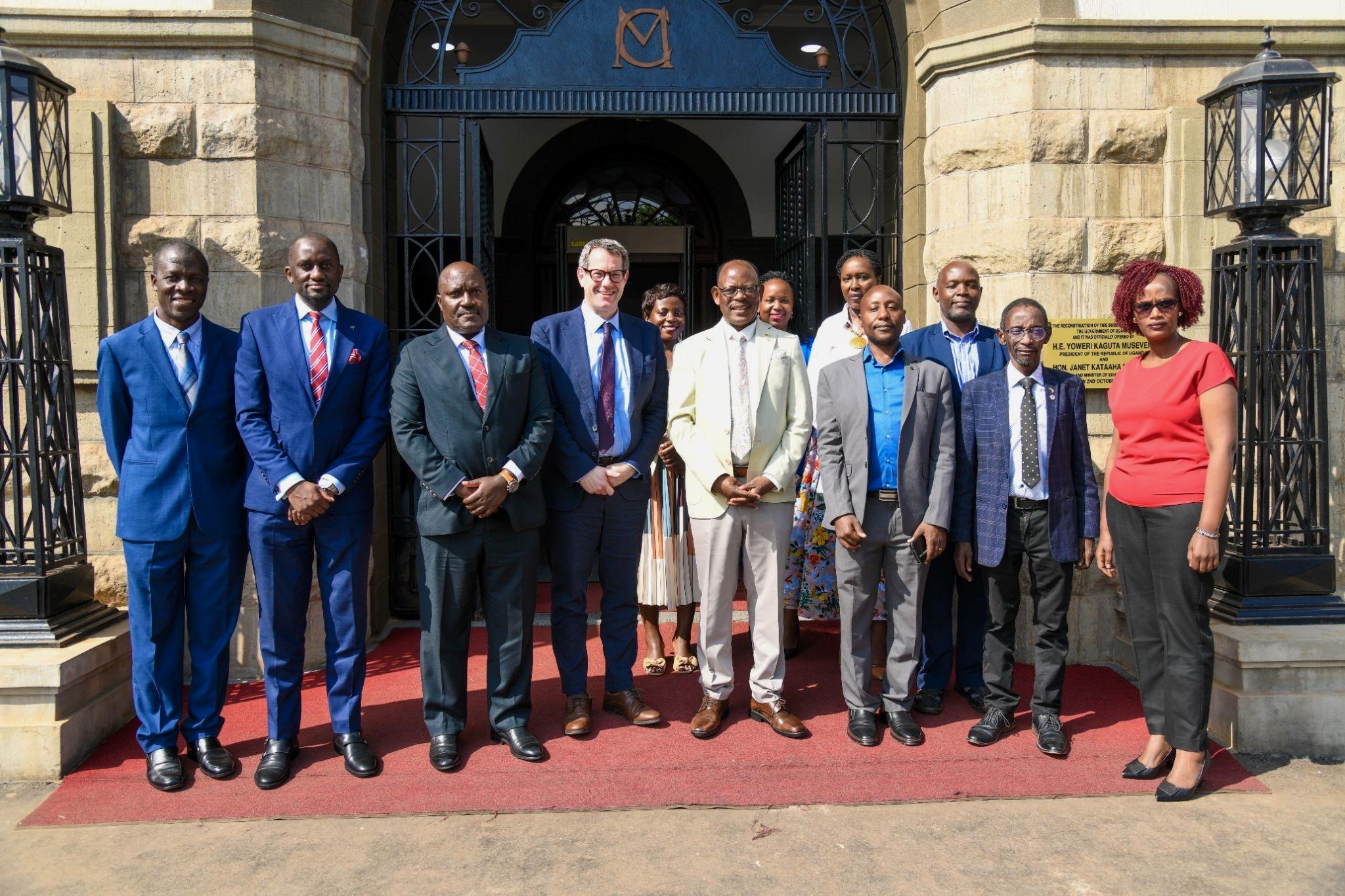
Makerere University continues to deepen its global engagement agenda through strategic partnerships that enhance research, innovation, and graduate training. On Friday, 13th February, 2025, during a recent engagement with a delegation from the University of Warwick (UK), university leaders, researchers, and administrators explored potential collaborations to address pressing development challenges and strengthen institutional capacity.
Expanding Collaboration in Research and Innovation
Welcoming the delegation, Prof. Fred Masagazi-Masaazi, Chairperson of the Makerere University Research and Innovations Fund (Mak-RIF) Grants Management Committee, emphasized the growing dialogue between Makerere University and the University of Warwick. He noted that ongoing discussions are focused on resource mobilization to support research and innovation, as well as building sustainable academic exchanges for both staff and students.
Dr. Roy Mayega, Mak-RIF Coordinator, together with Mrs. Phoebe Lutaaya Kamya, Deputy Coordinator, and members of the Mak-RIF team, highlighted the Fund’s role in catalyzing collaborative research and strengthening partnerships that translate research into societal impact.
Mr. Simon Kizito, Deputy University Secretary, outlined key areas identified for collaboration, including joint research and innovation initiatives, benchmarking visits across disciplines such as law, science, and ICT, and student exchanges designed to strengthen applied research skills. He also pointed to opportunities for training Makerere staff in specialized areas such as tropical diseases and innovation ecosystems, drawing lessons from Warwick’s strong linkages with industry partners located within its campus.
Makerere’s Strategic Priorities and Global Role
In his remarks, the Vice Chancellor underscored the longstanding relationship between Makerere University and the University of Warwick, dating back to the early 1980s, initially through staff training and more recently through collaborative research.
He highlighted Makerere’s historic contribution to leadership development across Africa and beyond, and the University’s continued growth following faculty rebuilding efforts in the 1980s, which have strengthened its research capacity. Today, Makerere has over 1,300 academic staff, more than 1,000 of whom hold PhDs, positioning the institution to play a leading role in knowledge production.
The Vice Chancellor also outlined major thematic areas where partnerships are critical:
- Climate change and food security: Researchers at the College of Agricultural and Environmental Sciences (CAES) are developing drought-resistant and high-yield seed varieties to address changing weather patterns and food insecurity.
- Public health and infectious diseases: Uganda faces frequent outbreaks of diseases such as Ebola and Marburg, and Makerere has built strong capacity in outbreak response and tropical medicine. The University’s medical school and the Infectious Diseases Institute (IDI) continue to play a pivotal role in research and treatment.
- Peace and conflict studies: Through initiatives such as the Rotary Peace Centre, Makerere contributes to training global leaders in conflict resolution.
- Climate-sensitive macroeconomic modelling: Makerere recently hosted a conference in collaboration with the Ministry of Finance, Planning and Economic Development to advocate for climate-responsive macroeconomic modelling and to plan for the establishment of a Centre of Excellence in this field.
- Innovation and technology: The University’s innovation ecosystem has produced notable outputs, including Africa’s first electric vehicle and ongoing work to expand incubation facilities to enable students to graduate with viable enterprises.
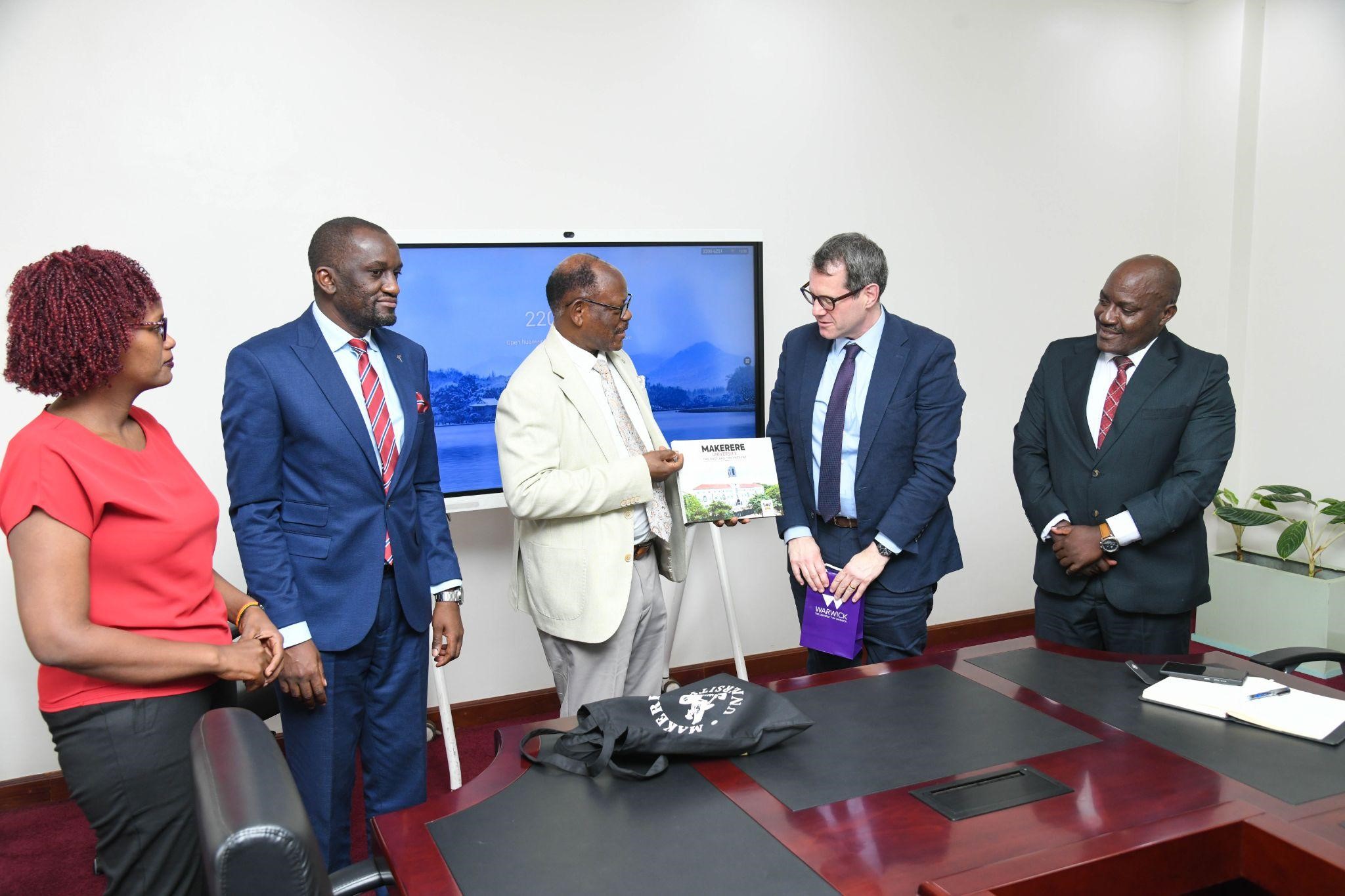
The Vice Chancellor emphasized that addressing youth unemployment remains a central priority, noting that innovation, entrepreneurship, and graduate training are essential to building stable societies.
He further stressed the importance of expanding graduate education. Africa currently produces a small proportion of global research output, and increasing PhD and Master’s training supported by international partnerships remains critical to accelerating knowledge production and development outcomes.
Internationalization and Shared Learning
Speaking on behalf of the University of Warwick, Professor Daniel Branch, Deputy Vice Chancellor, reflected on Warwick’s own institutional journey, noting that its growth has been driven by a strong focus on internationalization, innovation, and research. He expressed Warwick’s commitment to building productive partnerships with African universities, including Makerere, to advance joint research, training, and innovation.
Professor Branch also highlighted the importance of university-industry linkages, citing examples such as collaborations with major manufacturing firms that provide practical training opportunities and inform curriculum development.
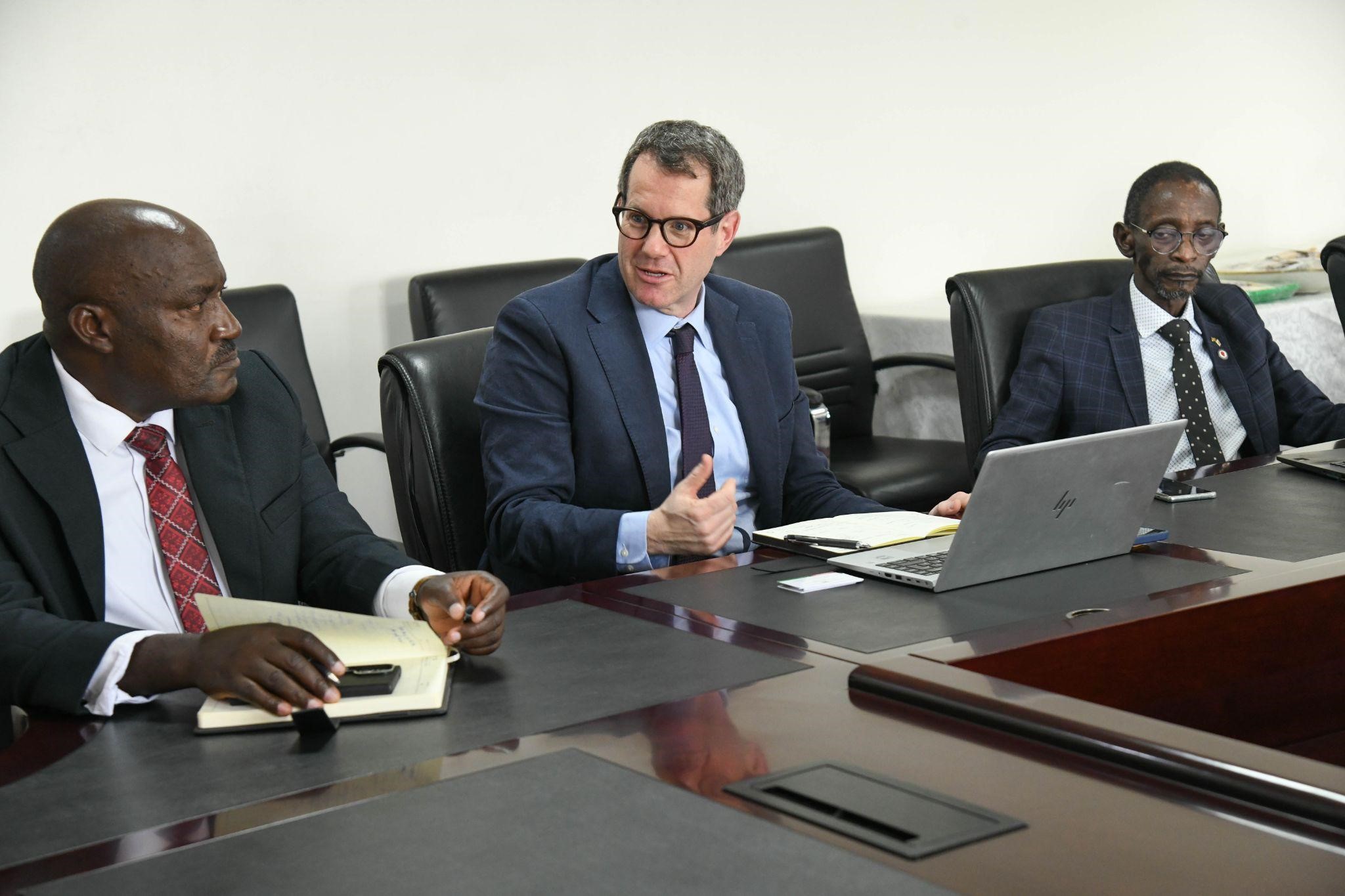
Showcasing Research and Innovation at CEDAT
A second session of the engagement was held at the College of Engineering, Design, Art and Technology (CEDAT), where academic leaders and researchers presented ongoing work across multiple disciplines.
Presentations included:
- Development of a solar water pump through reverse engineering (Dr. Edmund Tumusiime)
- Crane Cloud, a locally developed cloud-computing platform (team from the College of Computing and Information Sciences)
- Profiling gaseous emissions associated with burnt bricks (Dr. Nathan)
- Integration of centralized grid and decentralized renewable off-grid systems: a techno-economic analysis (Dr. Abubaker Waswa)
- Innovation and digitalization pathways for affordable housing in Sub-Saharan Africa (Prof. Stephen Mukiibi)
The session was attended by CEDAT leadership, including the Principal, Prof. Moses Musinguzi, as well as deans and heads of department from engineering, built environment, and industrial and fine arts. The day’s activities were concluded with a tour of Makerere University’s Innovation Hub.
The engagement reaffirmed Makerere University’s commitment to building strong, mutually beneficial partnerships that accelerate research, strengthen graduate training, and drive innovation. As global challenges such as climate change, public health threats, and youth unemployment intensify, collaboration among universities remains essential to developing scalable, evidence-based solutions.
Through partnerships such as the one Makerere University and the University of Warwick hope to activate through a Memorandum of Understanding in the near future, Makerere continues to position itself as a leading research-intensive university dedicated to transforming society through knowledge, innovation, and global cooperation.
Caroline Kainomugisha is the Communications Officer, Advancement Office, Makerere University.
General
Mastercard Foundation Scholars embrace and honour their rich cultural diversity
Published
5 days agoon
February 18, 2026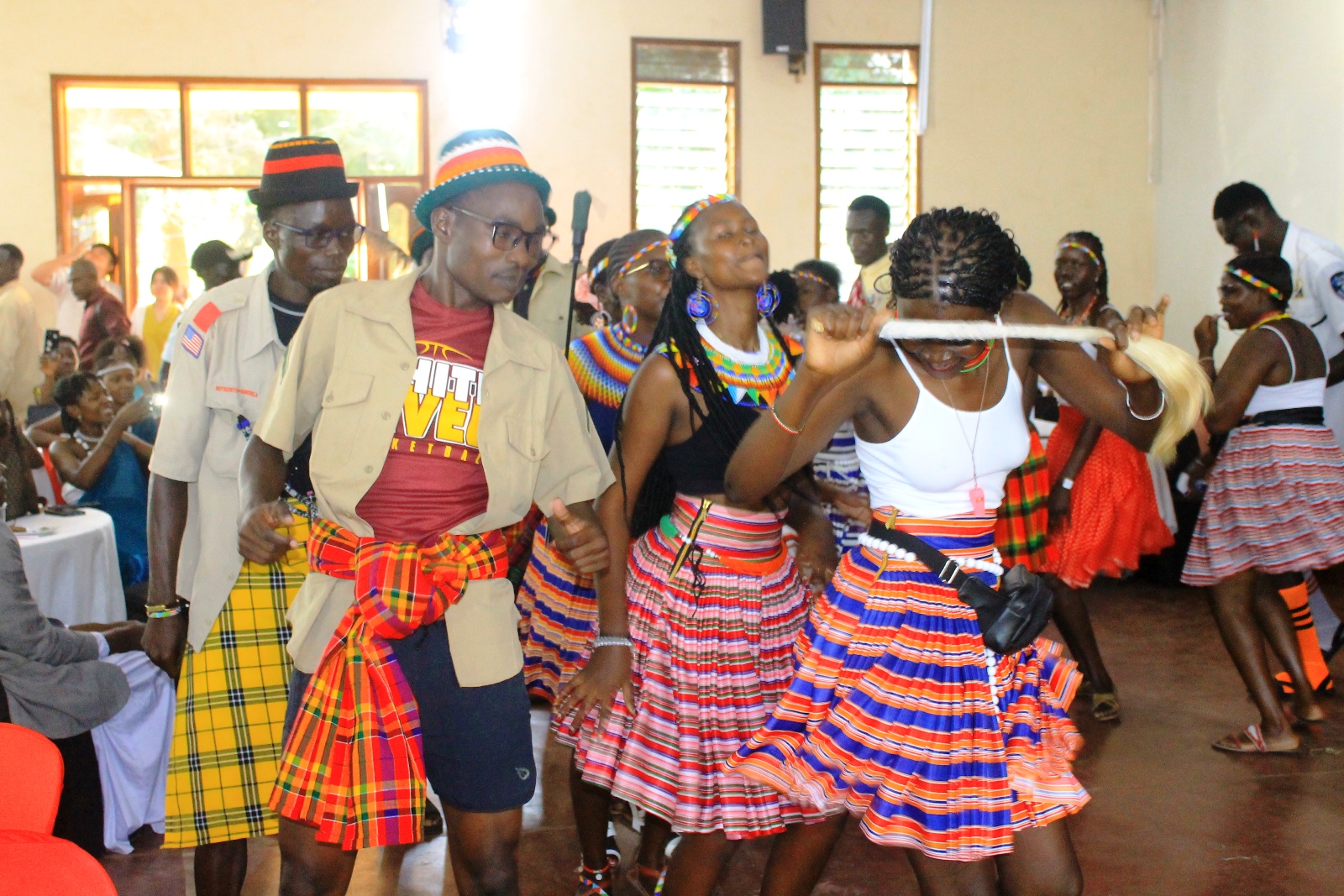
On the evening of Friday, 13th February 2026, the Scholars of Mastercard Foundation embraced the new semester with enthusiasm and celebration, showcasing their rich cultural diversity at the annual cultural dinner. This event not only fostered a sense of community but also highlighted the importance of cultural exchange and understanding among the scholars. The purpose of the cultural dinner is to foster unity in diversity within the Scholars community and to enable young people to appreciate and respect each other’s cultural differences.
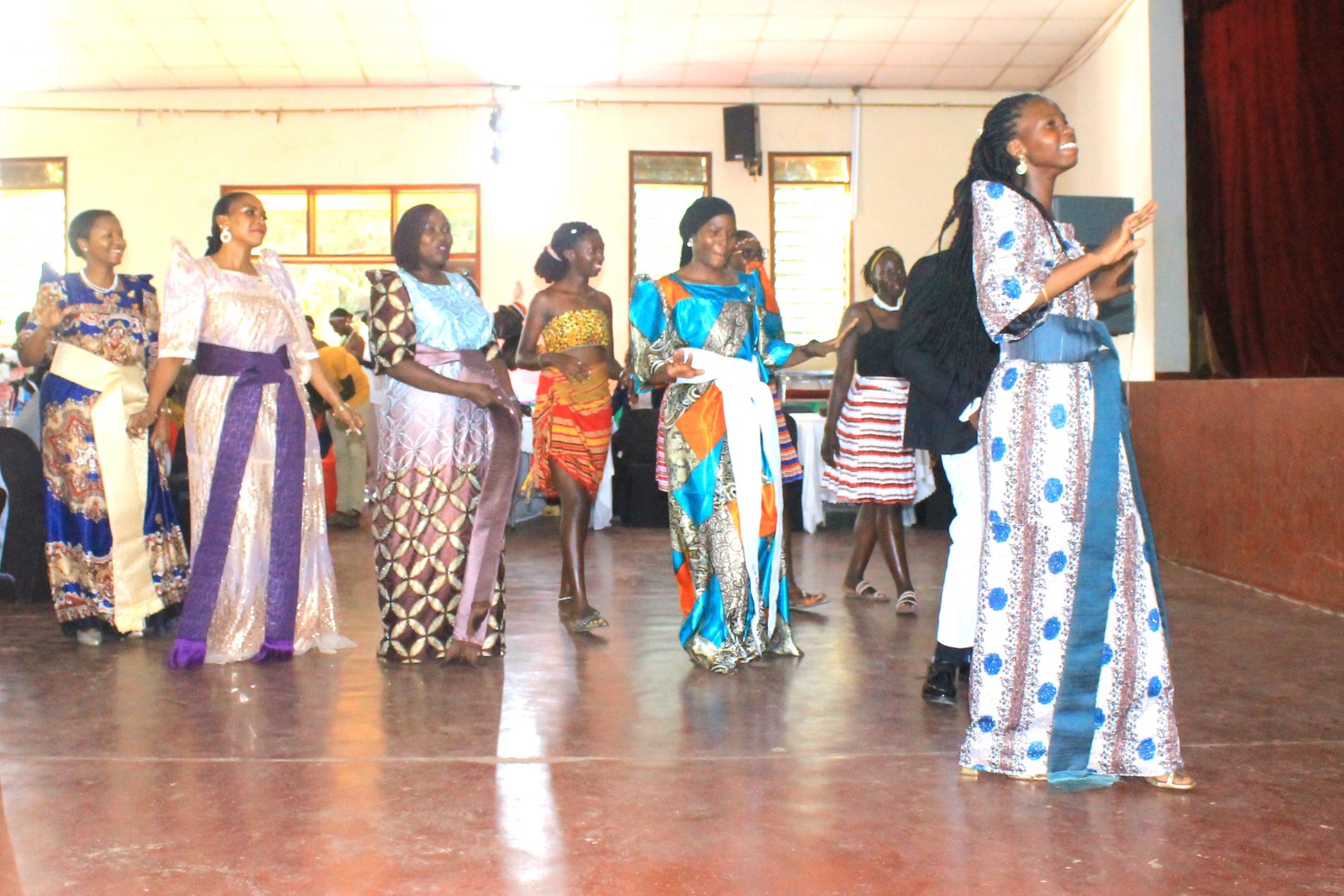
The Mastercard Foundation Scholars community at Makerere University is a vibrant tapestry of countries, cultures, and backgrounds. In recognition of this richness, the Program team has proposed organising an annual cultural dinner to kick off each new semester. This event aims to achieve several important objectives:
- Promote mutual understanding and cross-cultural appreciation among Scholars.
- Celebrate and highlight the unique cultural identities within our community.
- Encourage confidence and creativity through a dynamic talent showcase.
- Foster a sense of unity and excitement as we embark on the new academic semester together.
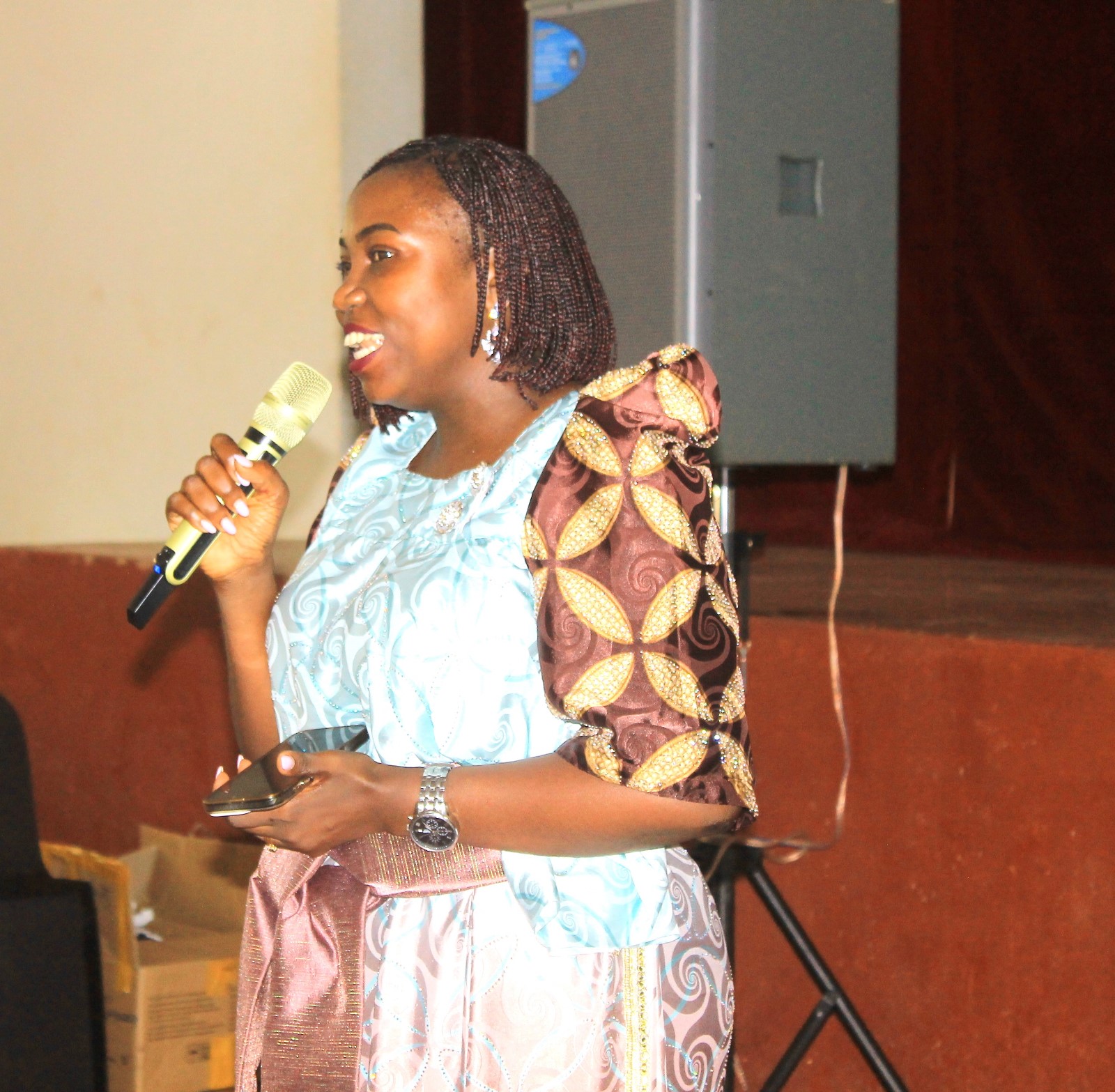
During the event, the Scholars proudly showcased their diverse cultures through a vibrant display of traditional attire, engaging dances, delectable dishes, and meaningful expressions in their native languages. The event showcased a rich tapestry of cultures, including the Baganda from Central Uganda; the Banyankore, Bakiga, Batooro, and Banyoro from Western Uganda; the Acholi from the North; the Karamojong from the Northeast; and the Basoga and Bagisu from the Eastern region, among many other indigenous tribes in Uganda. Additionally, attendees enjoyed cultural performances from South Sudan, Rwanda, and the Democratic Republic of Congo, celebrating the unique heritage of each community.
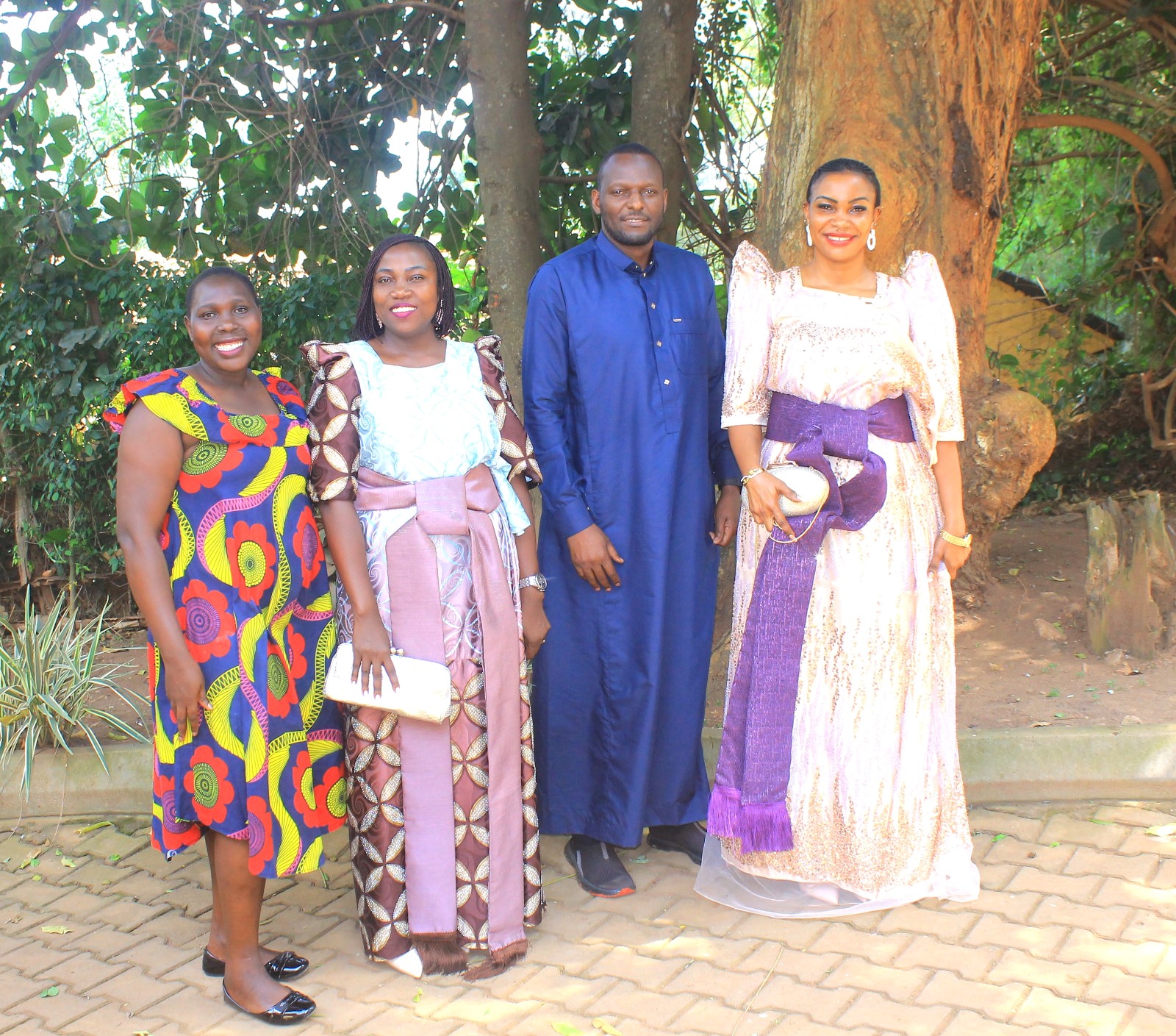
The event also featured a vibrant showcase of cultural attire, accompanied by traditional songs and dances. Attendees enjoyed cultural dress modelling, engaging performances, art displays, and interactive quizzes, culminating in exciting prizes awarded to outstanding performers. This diverse array of activities contributed to a rich celebration of creativity and cultural exchange.
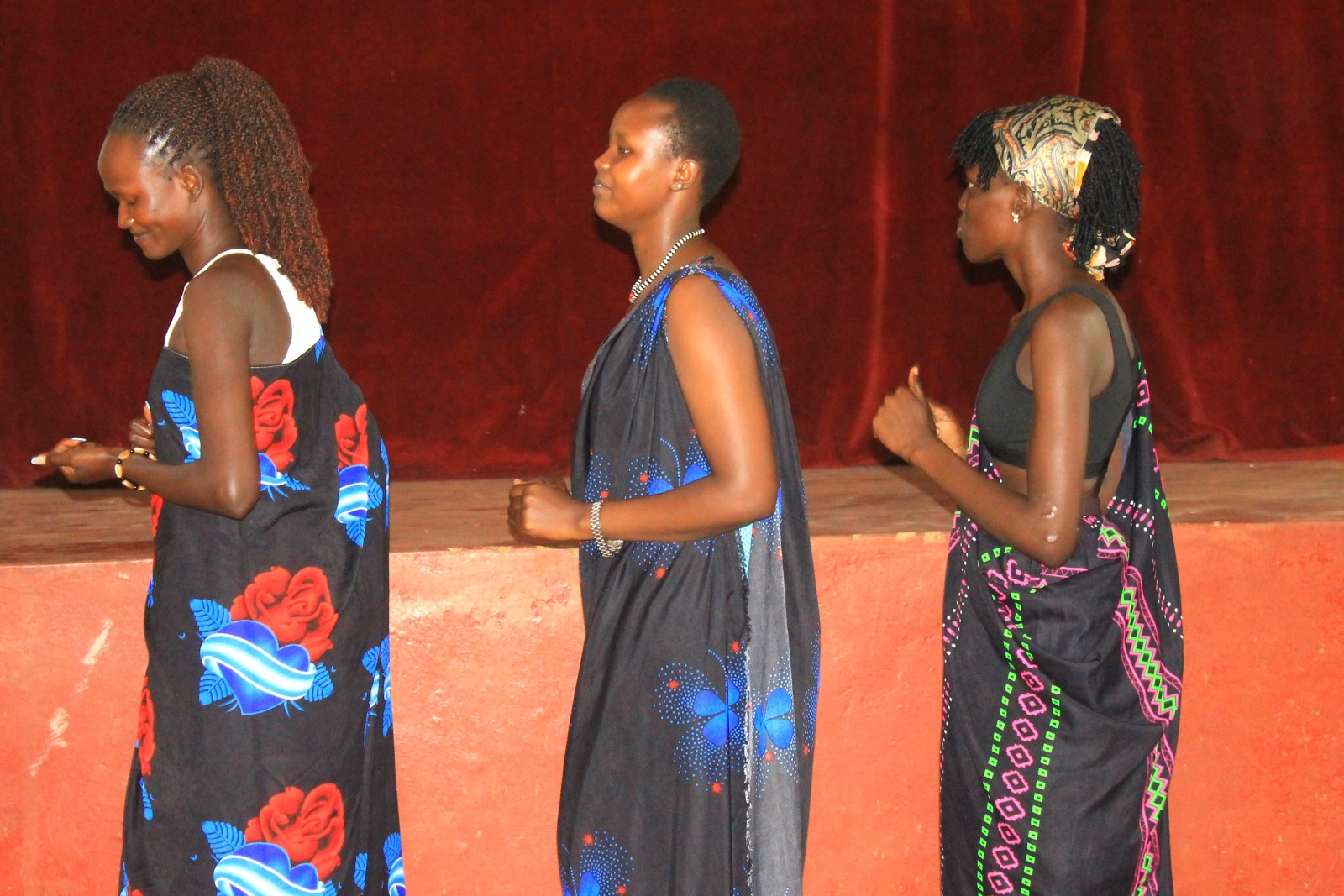
The Mastercard Foundation Scholars Program at Makerere University is committed to fostering holistic development, community building, and leadership among Scholars. At the start of each semester, the Program Team hosts a cultural dinner to reconnect the Scholars community, share key Program updates, and create an inclusive space to strengthen belonging and engagement. The cultural dinner is a critical platform for raising awareness of the need to appreciate and respect cultural diversity.
Bernard Buteera is the Principal Communications Officer for the Mastercard Foundation Scholars Program at Makerere University.
More Photos from the Dinner
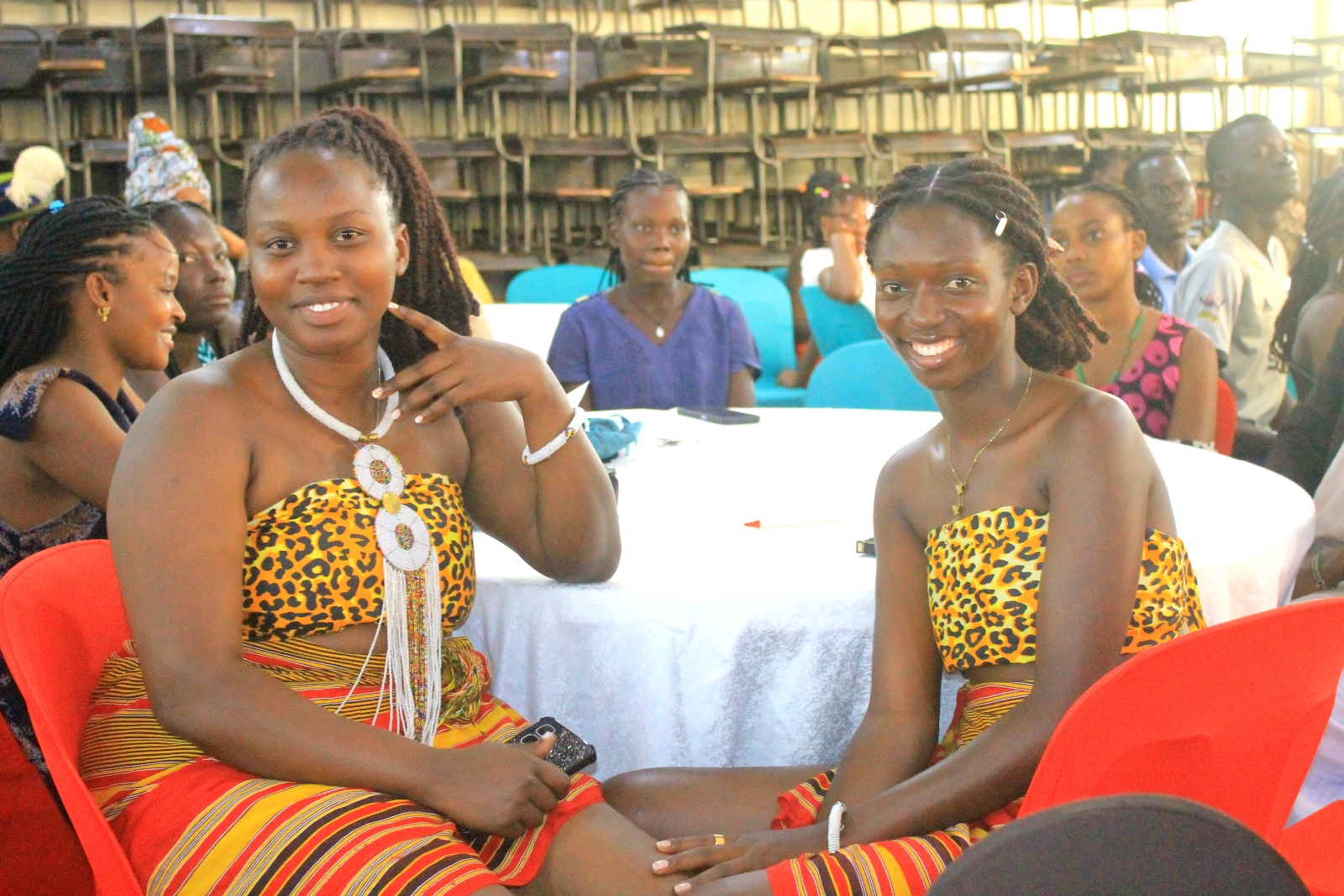
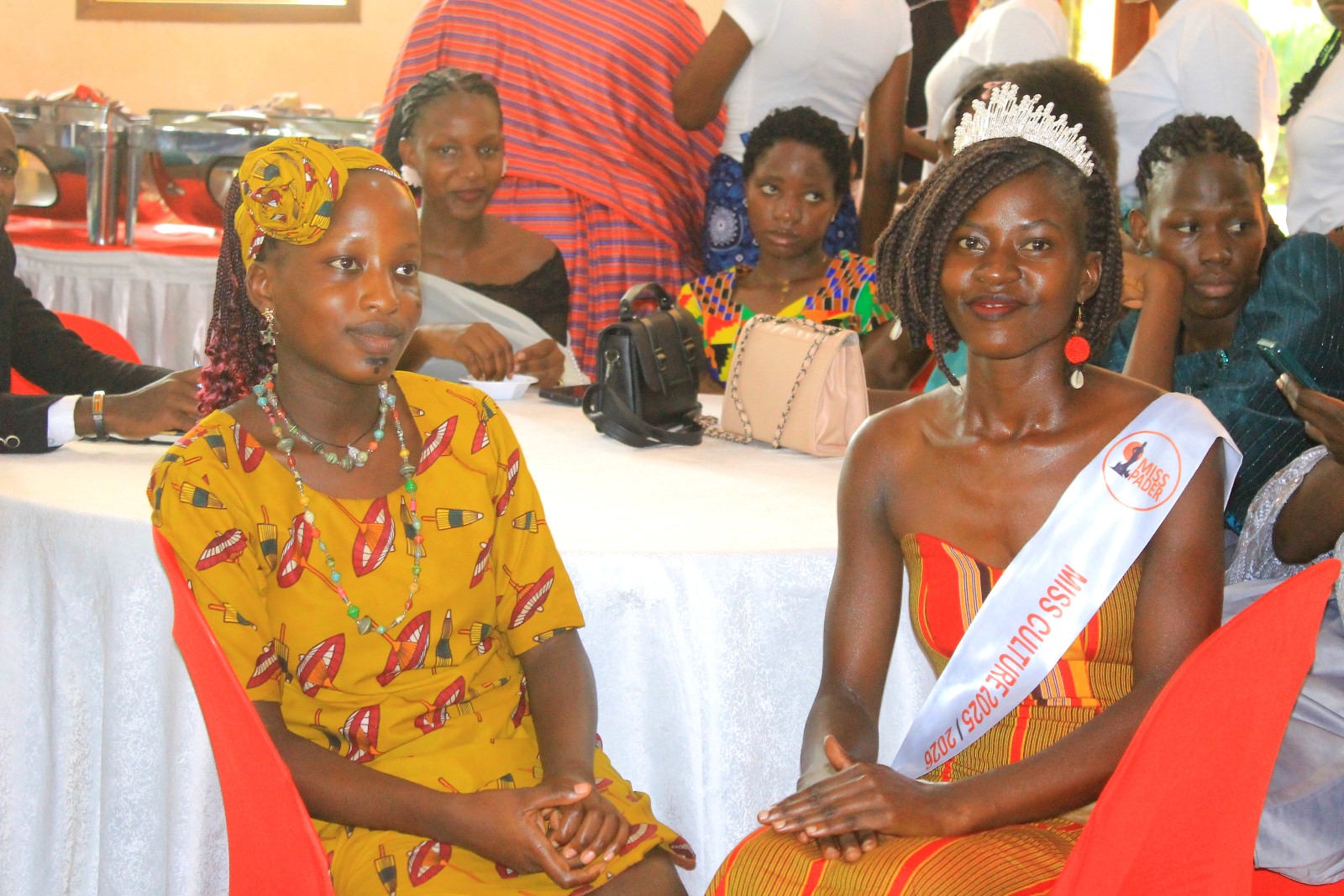
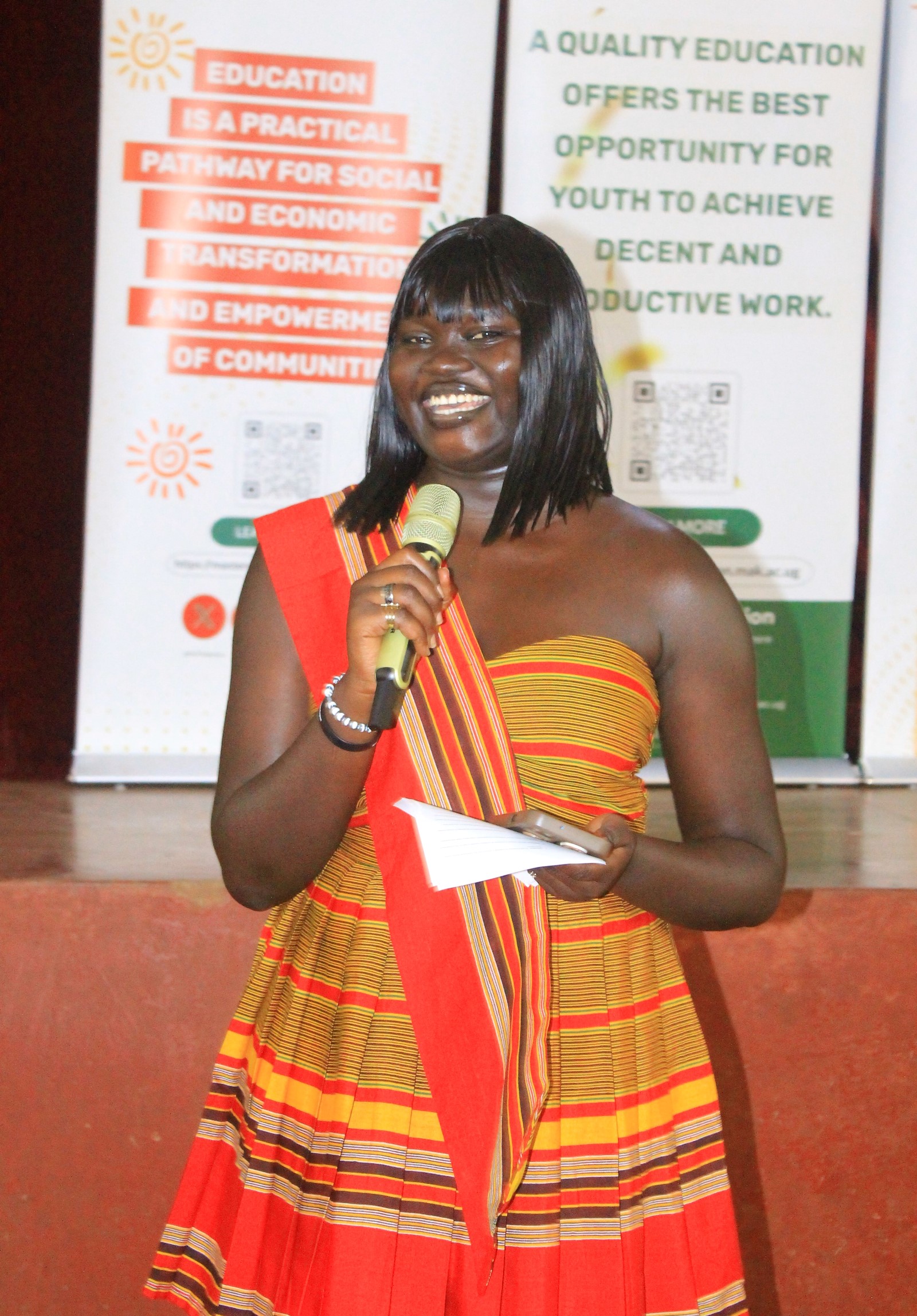
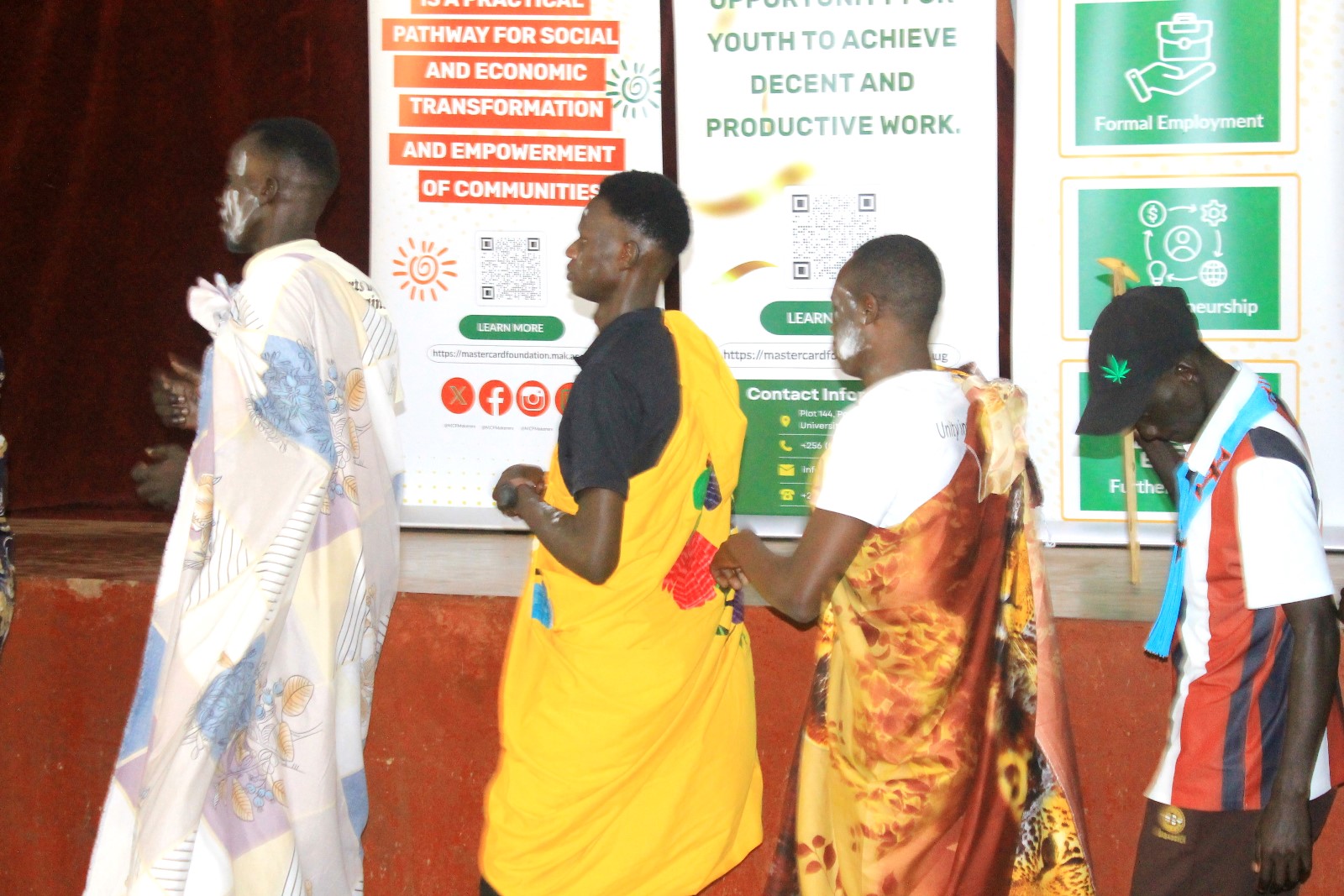
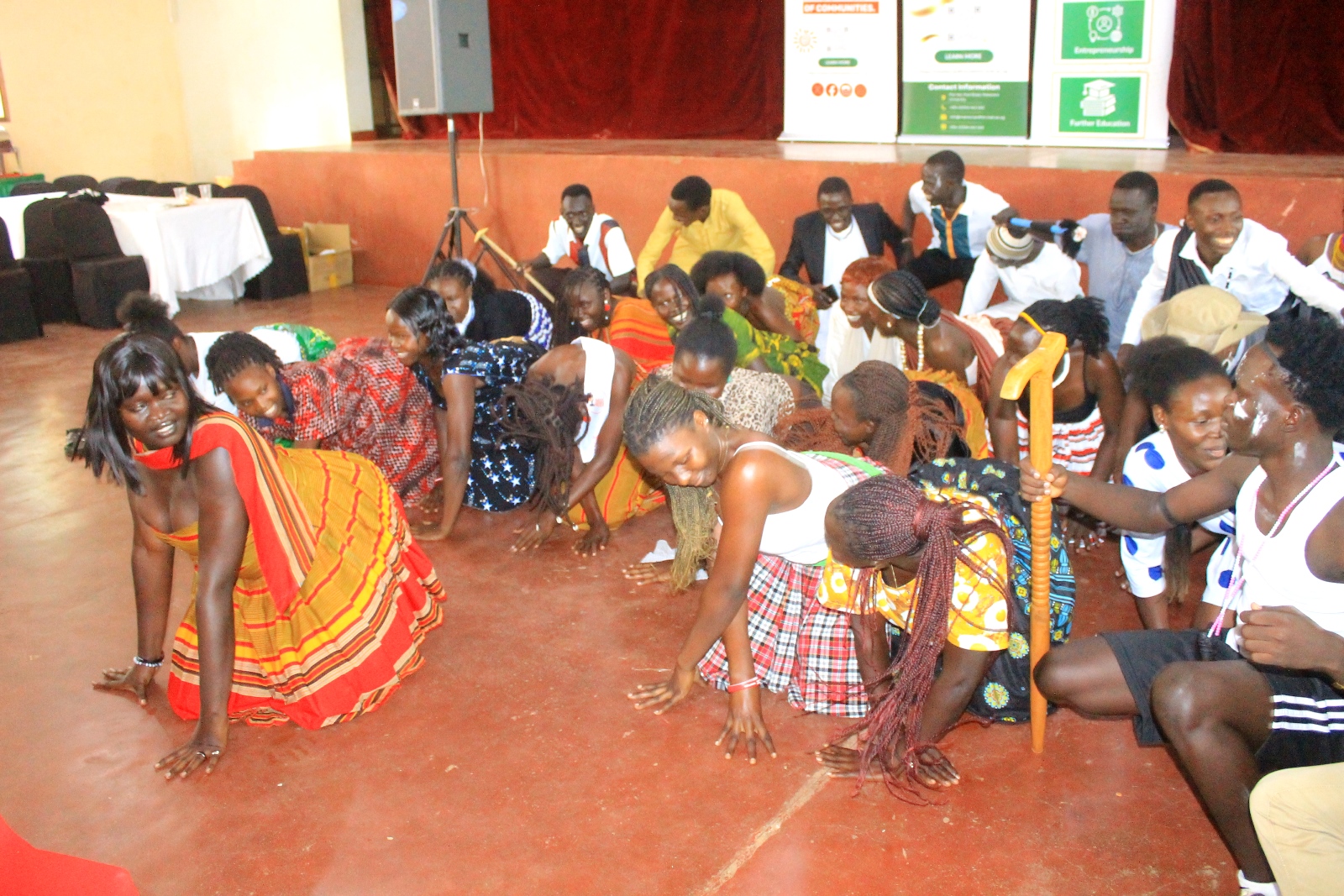
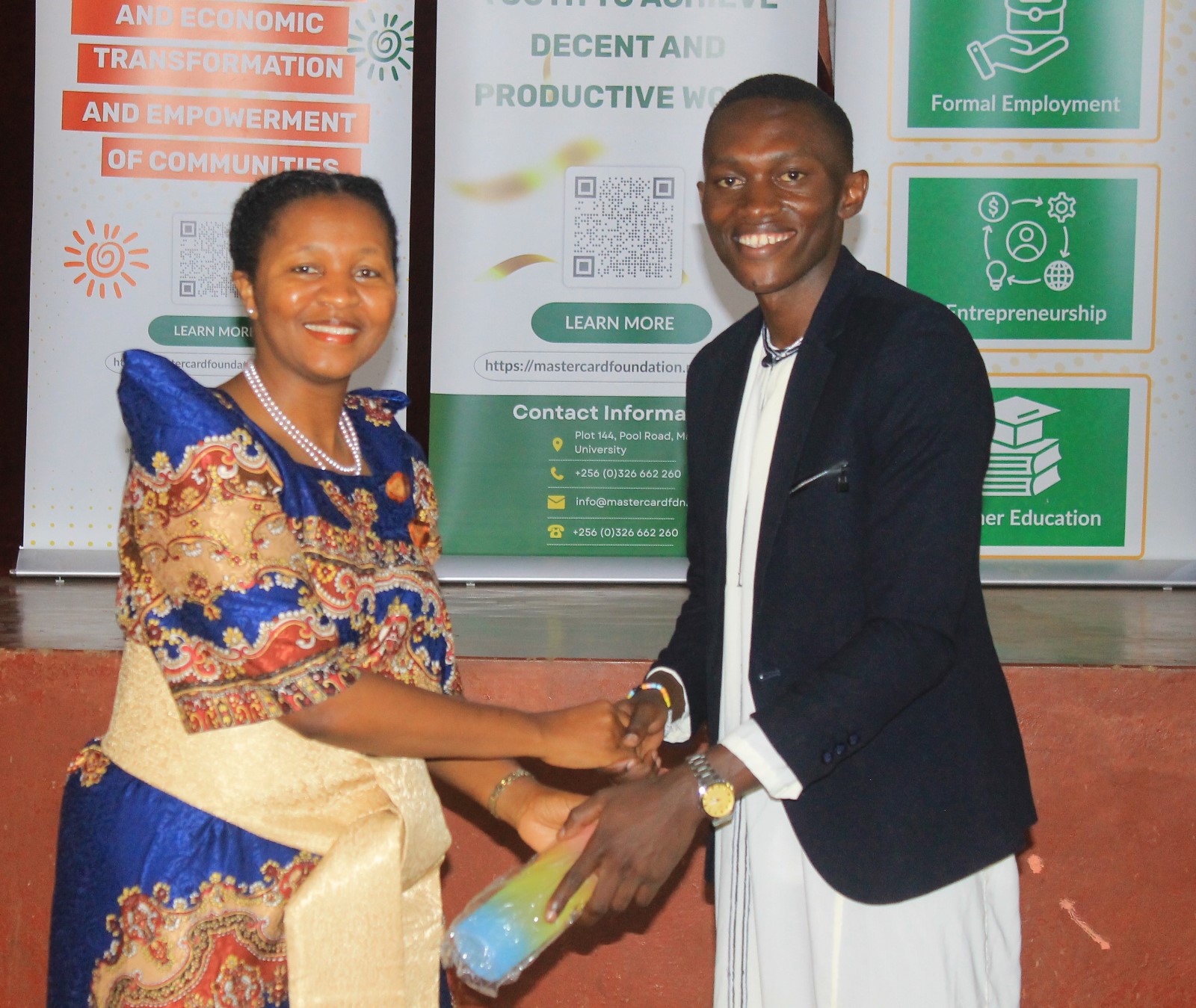
Trending
-

 General2 weeks ago
General2 weeks agoAptitude Exam (Paper 1) Results for the Mature Age Entry Scheme 2026/2027
-

 Health4 days ago
Health4 days agoUganda has until 2030 to end Open Defecation as Ntaro’s PhD Examines Kabale’s Progress
-

 Health2 weeks ago
Health2 weeks agoHow Jimmy Osuret Turned Childhood Trauma into Evidence for Safer School Crossings
-

 General2 weeks ago
General2 weeks agoFor Youth by Youth – Call for Second Cohort Applications
-

 General5 days ago
General5 days agoMastercard Foundation Scholars embrace and honour their rich cultural diversity
